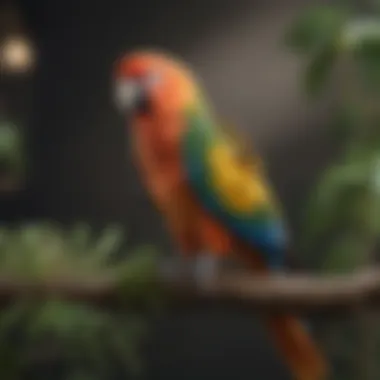Understanding Pet Bird Lifespans and Care Practices


Intro
The lifespan of pet birds is influenced by a myriad of factors including their species, diet, environment, and care practices. Understanding these factors not only helps bird owners foster a thriving habitat but also improves the overall well-being and lifespan of avian companions. This guide intends to expound on various elements contributing to longevity in pet birds, offering valuable insights and tips that will enrich the lives of these feathered creatures.
Care Tips
Daily Care Routines
Consistent daily care routines are crucial for maintaining a bird's health. Providing fresh water, cleaning food dishes, and engaging in regular interaction are fundamental. Birds are social and benefit from daily handling; this practice builds trust and familiarity between the bird and its owner. Additionally, observing one's bird during these interactions allows for early detection of any concerning behaviors.
Cage Setup and Maintenance
The arrangement of a bird's living space has a significant impact on its quality of life. Cages should be spacious enough, allowing birds to move around freely. Placement of perches should vary in height and thickness, accommodating different activities and preferences. All cages require regular cleaning to prevent build-up of bacteria. Once a week, conduct a thorough clean and replace any soiled bedding.
Hygiene and Cleaning Practices
Hygiene cannot be overlooked. Cleanliness is paramount for a healthy bird. Use bird-safe cleaning products to wipe down the cage, changing trays, and toys. Be sure to scrub surfaces to remove dirt and residue.
Regular washing of all cage items minimizes disease risk and promotes overall well-being.
Seasonal Care Adjustments
As seasons shift, so do requirements for bird care. In colder months, ensure that birds remain warm, positioning their cages away from drafts. Heating lamps may be utilized, ensuring they are appropriate to avoid any fire hazards. Meanwhile, in summer, maintain optimal temperature levels and provide strides electrolyte supplements to combat heat stress.
Behavioral Insights
Understanding Bird Body Language
Birds communicate in various ways, healthy understanding of their body language is valuable for pet owners. Feather fluffing can indicate contentment, while pacing may signify irritability. By listening to their body language, owners can respond more effectively to their feathered friends' needs.
Common Behavioral Issues and Solutions
Birds may exhibit behavioral problems due to stress or inadequate stimulation. Common issues include screaming, feather plucking, or aggressive behaviors. Identifying triggers is essential in troubleshooting. Many behavioral issues can be promptly solved with environmental adjustments and enriching activities.
Positive Reinforcement Techniques
Applying positive reinforcement can aid in modifying behavior. For example, rewarding a bird with treats when it performs desired actions leads to repeated behavior in future situations. This method is essential for building companionship as well.
Social Interaction Needs
Socialization is vital for birds. Ideally, pet owners should invest time in their day to interact with their birds. Incorporating playtime and open conversations fosters a balance that enhances the emotional health of the bird.
Nutrition Guides
Essential Diet Components
A bird's diet plays a key role in its health and longevity. Nutrient-rich meals comprise a mix of pellets, fruits, vegetables, and selective seeds. Developing a knowledge of your pet's specific dietary needs is important for vitality and lowering the risk of disease.
Safe and Toxic Foods
Awareness of which foods are safe and toxic is critical. Avocado, chocolate, and certain nuts can be dangerous. Meanwhile, spinach in moderation can be beneficial. Compile a list and routinely refresh it in your mind to ensure a safe diet.
Supplements and Treats
Occasional snacks are suitable, but moderation is key. Vitamins or calcium supplements should be considered if recommended by a vet. Treats can reinforce bond and make excellent training tools.
Feeding Strategies for Different Species
Some bird species need different feeding approaches based on their natural habits. For example, larger species might require more exotic fruits, while smaller ones often thrive on vegetables. Observing species-specific habits is helpful in assembling the right diet.
Wellness and Health
Routine Health Checkups
Regular checkups with an avian vet should not be missed. Annual examinations help catch potential health issues before they escalate. It is critical to ensure these checkups include blood work for your bird’s age and breed, helping detect problems early on.
Identifying Symptoms of Illness


Any change in bird behavior can indicate illness. Altered appetite, change in droppings, or lethargy should prompt immediate inquiries. Early identification is the key to prompt and effective treatment.
Preventative Care and Vaccinations
Preventative care is essential for longevity. Stay informed about vaccinations that your bird may need as CSd diseases are often avoidable with appropriate images. Maintaining parasite prevention spans from proper hygiene to routine vet visits are vital in promoting healthy longevity.
Mental and Emotional Well-being
Mental stimulation plays a role in emotional health. Understanding this isn’t just frivolous; birds need robust interaction to thrive fully. Engage them in various activities and observe how this affects their mood and attitude towards their surroundings.
Enriching Activities
Toys and Playtime Ideas
Various bird toys, like foraging puzzles or simple softwood balls, not only keep birds engaged but help satisfy natural instincts. Change toys regularly to provide novelty and excitement within their cages.
Training and Tricks
Training projects offer mental stimulation for both the owner and the pet. Start simple; most birds can learn phrases or perform tricks. This collaboration cements the bond and challenges the light of cognition.
Outdoor Activities and Interaction
Safely introducing birds to the outdoors can enrich their everyday experience. Using flight harnesses or bird-safe enclosures can create new worlds for them to explore alongside you.
DIY Projects for Mental Stimulation
Often overlooked, do it yourself (DIY) projects can save bird owners money while providing unique enrichment. Pearipnsg activities not only feed their inherent curiosity but encourage idea longevity of enjoyment in their day.
Prelude
The longevity of pet birds not only relates to their species but also the environment they live in and the care they receive. High-quality care can significantly enhance a bird's lifespan. Adequate knowledge about how to maintain a bird's health and happiness is beneficial for all current or prospective bird owners.
"Investing time and effort in understanding your pet bird’s needs is key to ensuring they enjoy a long and healthy life."
Maintaining longevity in pet birds translates into significant emotional rewards. Successful care improves their wellbeing and creates strong bonds between owners and their avian companions. Hence, examining this topic adds substantial value for bird enthusiasts.
Importance of Bird Longevity
Bird longevity plays a vital role in responsible pet ownership. The implications are twofold; it underscores both the physical wellbeing of birds and the psychological aspects related to their life quality. A longer lifespan can lead to deeper relationships, as owners learn and adapt with their pets over many years.
In addition, most bird species, such as cockatiels or canaries, flourish with proper care and adequate attention. Bird longevity can be strongly influenced by genetics, health care, and environmental conditions. Knowing more about how these factors work together can help owners take informed actions.
Overview of Common Pet Bird Species
There are numerous bird species that people keep as pets, each with unique care requirements and lifespan expectations. Here, we will emphasize some commonly kept pet birds:
- Budgerigars: Often simply referred to as budgies, these small birds typically need about 5 to 10 years in captivity, although some can live up to 15 years with proper care.
- Cockatiels: Friendly and social, cockatiels generally have a lifespan of 10 to 15 years.
- African Grey Parrots: Recognized for their intelligence, African Grey Parrots usually live around 20 to 30 years, and in some cases, can even reach 50 years with exceptional care.
- Lovebirds: These small, affectionate birds often live for about 10 to 15 years.
- Canaries: Known for their singing, canaries have a lifespan ranging from 10 to 15 years as well.
Choosing one of these species involves careful thought not just about their expected lifespan, but also how they fit into one's lifestyle and the time they can commit to their care. Understanding these factors equips owners to provide better environments for their birds and ask questions related to their specific needs.
Typical Lifespan of Pet Birds
In understanding the longevity of pet birds, knowing their typical lifespan is crucial. Each species comes with its own life expectancy influenced by genetics, care, and environment. This section aims to shed light on the average lifespans of various common pet bird species, additionally or individually reinforcing the essential practices that promote a longer, healthier life.
Budgerigar Lifespan
Budgerigars, often known as budgies, generally have a lifespan ranging from 5 to 10 years in captivity, but some individuals have been reported living beyond 15 years with exceptional care. Their lifespans depend significantly on diet, social interaction, and overall health. When owners provide a balanced diet rich in seeds, fruits, and vegetables, they can significantly influence their budgie's life expectancy.
Cockatiel Lifespan
Cockatiels typically live 10 to 15 years and can even reach up to 20 years with optimal care. They require not just physical health but also mental stimulation. Engaging activities can prevent boredom and behavioral issues that shortens their life. Diet plays a role in their longevity, too. A high-quality, varied diet combining pellets, seeds, and fresh foods is essential.
African Grey Parrot Lifespan
African Grey Parrots are known for their intelligence and can live from 40 to 60 years with proper care. They thrive on social interaction and require plenty of opportunities for mental engagement. Hence, caregivers should allow for ample out-of-cage time and provide puzzles or toys. Their specific dietary needs also should be met. A nutrient-rich, diverse diet significantly benefits their health in the long run.
Lovebird Lifespan
Lovebirds usually enjoy a lifespan of 10 to 15 years, although exceptional instances up to 20 years have been documented. These social creatures need plenty of interaction as well as a mix of seeds, pellets, and fresh produce to help them flourish. A proper environment that caters to their nibbling instincts with safe toys can further enhance their lifespan.


Canary Lifespan
Canaries' lifespans can vary typically between 10 and 15 years. Their health hinges directly on nutrition, social encounters, and space. Providing a spacious cage and proper companionship is necessary. Canary diets should be full of seeds spurting new life and as fresh vegetables periodically used can make a notable difference in their overall health and happiness.
Factors Affecting Lifespan
Understanding the factors that influence the lifespan of pet birds is essential for bird owners aiming to provide the best care possible. Multiple elements come into play, each impacting the overall well-being of these cherished companions. By considering these factors, the owner can truly enhance their bird's quality of life, directly correlating to its longevity.
Genetics and Species Characteristics
Genetics holds a significant role when discussing lifespans of pet birds. Each species comes with inherent traits affecting their longevity. For example, larger species, such as the African Grey Parrot, generally live longer than smaller types like Budgerigars. The variances in life expectancy can often be traced back to species-specific genetic factors. These can include resilience to certain diseases and overall physiological adaptability.
Breeders should prioritize healthy genetic lines to improve the lifespan of their birds. Evaluating family histories and ensuring the absence of hereditary issues become steps towards more sustainable practices in breeding, ensuring vibrant and long-lived avian companions.
Nutrition and Diet Quality
The diet of a pet bird plays a crucial role in its health and lifespans, as a balanced and nutritious intake directly affects the bird's physiological condition. Birds require a mix of seeds, pellets, fruits, and vegetables to receive essential vitamins and minerals. For instance, over-reliance on seeds can result in nutritional deficiencies, leading to problems like obesity and shorter lifespans.
Proper supplementation also warrants attention. Nutritional needs may change with age or specific health conditions. Below are elements that highlight the importance of nutrition:
- Variety: Different food types prevent nutritional gaps.
- Freshness: Always provide fresh food to avoid spoilage impacts.
- Clean Water: This is often overlooked, yet essential.
Incorporating all these promotes a higher quality of life, which reflects on the bird's capacity to live longer.
Environmental Conditions
Environmental factors also contribute greatly to avian longevity. Birds need spaces devoid of stressors. A calm and secure environment can prevent detrimental effects associated with anxiety and fear. Factors such as noise, temperature, and housing conditions necessitate careful consideration.
Here are some key components of optimal environments:
- Cage Size: Adequate space for movement promotes physical health.
- Temperature and Climate Control: More temperature stability leads to less behavioral stress.
- Lack of Toxic Materials: This includes paint, fumes from heating elements, and chemicals.
Ensure a safe atmosphere correlates with a happier bird, ultimately positively affecting its lifespan.
Social Interaction and Enrichment
Birds are natural flock animals, needing social interaction to thrive. Loneliness can lead to behavioral issues, which can compromise their health and thus reduce their lifespans. Providing essential social interaction requires households with pets, or at least interaction with the owner. Engaging in regular playtime enriches their minds and keeps them active.
Moreover, environmental enrichment is equally important. This can include toys that stimulate calculations or swings that allow exercise.
To promote both mental stimulations and active living, consider:
- Toys: Choosing interactive toysuitable for curling or pecking.
- Foraging: Encouraging natural foraging will fulfill instinctual habits.
- Visitation: Allow for exposure to non-threatening animals or other birds whenever feasible.
These elements form well-being that can lead to extended lifetimes, signifying the richness of their presence in the owner's life.
Common Health Issues in Pet Birds
Understanding common health issues in pet birds is a vital aspect of promoting their well-being. Birds, as small and exotic companions, are susceptible to various health problems that, if not addressed, can significantly shorten their lifespan. By recognizing these conditions early, bird owners can take proactive steps to mitigate risks, ensuring a longer and healthier life for their feathered friends.
Respiratory Conditions
Respiratory health is crucial for pet birds. Birds have unique anatomies that make them particularly vulnerable to diseases affecting the respiratory system. Infections caused by bacteria, viruses, or fungi can lead to serious complications, sometimes resulting in devastating outcomes. Recognizing signs of respiratory distress is important. These can include labored breathing, wheezing sounds, and nasal discharge.
Several factors commonly contribute to respiratory diseases in birds:
- Poor air quality due to smoke, dust, or aerosol sprays
- Exposure to harmful substances such as fragrances or cleaning agents
- Stress from lack of space or social interactions
Regular vet check-ups is advised to monitor lung health. Providing ample ventilation and avoiding harmful products can also promote a healthier environment for pet birds.
Obesity and Its Consequences
Obesity is a growing concern among pet birds, often resulting from improper diet and lack of exercise. Birds that are overweight face many health issues, including heart disease, liver dysfunction, and reduced mobility. A high-fat diet rich in seeds without the necessary fruits and vegetables can create imbalances that lead to this health concern.
Awareness of an ideal weight range is essential. Owners should:
- Provide a balanced diet, incorporating fresh produce.
- Offer varied cuisine to maintain interest in healthy food.
- Encourage playtime and physical activities through toys and interaction.
- Monitor weight at regular veterinary check-ups.


Controlling obesity in pet birds not only helps with lifespan but also enhances their quality of life.
Feather Picking and Behavioral Issues
Feather picking is an alarming behavior that can affect pet birds, leading to severe physical and psychological harm. When birds excessively pluck their feathers, they often do this out of boredom, stress, or even medical conditions that need addressing. This condition can result in exposed skin and infections, making it both a health and emotional concern. It is crucial that owners understand common causas. For problematic chewing, improper comfort, or changes in birds environment often trigger this behavior. To mitigate includes:
Providing Adequate mental stimulation:
- Offer toys that encourage foraging and play.
- Routine handling and bonding activities.
Creating a Stable Atmosphere:
- Ensure a calm environment with minimal stressful changes.
- Observe interactions with other animals and manage appropriately.
As a pet bird owner, pinpointing and addressing these health issues is vital. Early detection and a focused approach can significantly influence the bird’s well-being and longevity. Proper education and preparation build respect between the bird and its environment, leading ultimately to the mutual happiness of both bird and caregiver.
Maximizing Lifespan Through Care
Maximizing the lifespan of pet birds is vital for their health and the joy they bring to their owners. Careful attention to various elements significantly impacts longevity. This section explores key practices that contribute to enhancing bird well-being. Addressing factors like environment, diet, health check-ups, and mental stimulation can help avian companions lead fuller lives.
Creating a Healthy Living Environment
Creating a healthy living environment plays a crucial role in a bird's lifespan. Cleanliness is essential; a hygienic space lowers the risk of disease. Avoid harsh cleaning agents. Instead, opt for bird-safe products to maintain the area around their aviary or cage.
The cage's size and layout should cater to the specific species, allowing enough space for movement. Proper bedding options are critical to avoiding hassles. Lighting matters too; access to natural light supports birds' vitamin D production. However, be cautious of direct sunlight, which can overheat or stress birds. Quiet spaces that minimize sudden distractions promote a sense of security.
Providing a Balanced Diet
Birds depend heavily on diet quality for longevity. A balanced diet addresses essential nutritional needs, reducing health problems. Various pet bird species have specific dietary requirements, necessitating tailored feed.
Seed mixes alone usually do not provide all nutrients. Hence, incorporate fresh fruits and vegetables to diet. Offer leafy greens, sweet potatoes, and a variety of seeds and grains in moderation. Limit high-fat seeds. Observe your bird’s preferences, ensuring adequate hydration by providing fresh water daily. Fortified pellets could also fill nutritional gaps.
Regular dietary changes can keep birds healthy and engaged, avoiding meals that may quell appetite or introduce boredom.
Regular Veterinary Check-Ups
Routine veterinary visits are necessary in understanding the health of pet birds. These appointments help in detecting early signs of illness before they escalate. Finding a vet who specializes in avian medicine is beneficial.
Veterinarians conduct check-ups that include assessing weight, feather condition, and fecal samples. During these visits, vaccinations might be discussed, depending on the bird’s species and lifestyle. Keeping records from each visit assists syncing care with different health insights.
Embracing regular veterinary check-ups guides owners on how often to visit. The frequency may depend on the bird species, age, and overall health.
Ensuring Mental Stimulation
Mental stimulation is as central on the well-being of birds as physical health factors. Boredom can lead to behavior problems, including feather picking or excessive screeching, which signal distress.
Interactive toys, perches, and puzzles can enhance a bird’s mental engagement. Select toys that require action, like foraging activities or moves to stimulate thinking. Redirect their natural instincts through activities that mimic flying, exploring, and discovering.
Incorporating supervised time outside the cage fosters bonding and mental agility. But prioritize safety during these outings. Variety is key, ensuring that boredom won’t set in. Rewrite routines so birds maintain excitement in everyday life, prolonging both mental and emotional fitness.
"A well-cared-for bird in an appropriate environment, nourished properly, and given ample check-ups maximizes desire to live longer and respond positively to interactions."
In summary, proper care strategies optimize lifespan. They encompass a thoughtful environment, diet awareness, veterinary consultations, and mental stimulation practices. Engaging in these care practices supports the quest for avial longevity, aligning the relationships we build with our cherished companions.
The Role of Owner Commitment
Commitment from the bird owner plays a critical role in ensuring the longevity and quality of life of pet birds. Understanding the scope of this commitment can enlighten bird owners on how their actions can positively affect the lifespan of their avian companions. It is essential to recognize that pet birds, like all animals, rely heavily on their caregivers, not only for daily needs but also for emotional and psychological well-being.
Understanding the Time Commitment
Each species of bird has unique needs, and it is vital that owners consider the time they must dedicate. Parrots, for instance, require significant social interaction because they are highly social creatures. Spending time daily to interact, train, and bond with your bird cannot be overstated if you want a thriving pet.
- Feeding: Preparing healthy meals can take valuable time, particularly if you are required to cut fresh fruits and vegetables daily.
- Exercise: Birds need physical activity substantial for muscle development and overall health. Setup the safe space to fly or provide toys that encourage movement.
- Cleaning and Maintenance: A clean environment is necessary for pet birds. At least once a week, deep clean the cage and renew water.
It’s crucial that any prospective owner considers their current lifestyle and examines whether they are capable of committing the necessary time. Birds, particularly more intelligent species, get bored easily, which may lead to destructive behaviors or health issues.
Finale
Summary of Key Points
- Lifespan Variation: Different species of birds have distinct lifespans. For instance, a Budgerigar generally lives up to 5 to 10 years, whereas an African Grey Parrot can soar to 50 years or more.
- Influencing Factors: Key factors like genetics, nutrition, and social interaction influence how long a bird may live. Awareness of these factors is crucial for fostering a healthy life.
- Health Matters: Preventative care is vital. Recognizing potential health issues can help address them before they become chronic problems.
- Caring Environment: A proper habitat and mental stimulation contribute significantly to a bird's overall quality of life.
- Owner Commitment: Bird owners must commit time and effort, not only to forge strong bonds but also to ensure constant care.
Final Thoughts on Bird Longevity
The time you dedicate to understanding your bird's needs impacts not only its lifespan but also the quality of its life. Bonding with your bird through positive interactions can enhance its emotional health, resulting in a more vibrant life.















